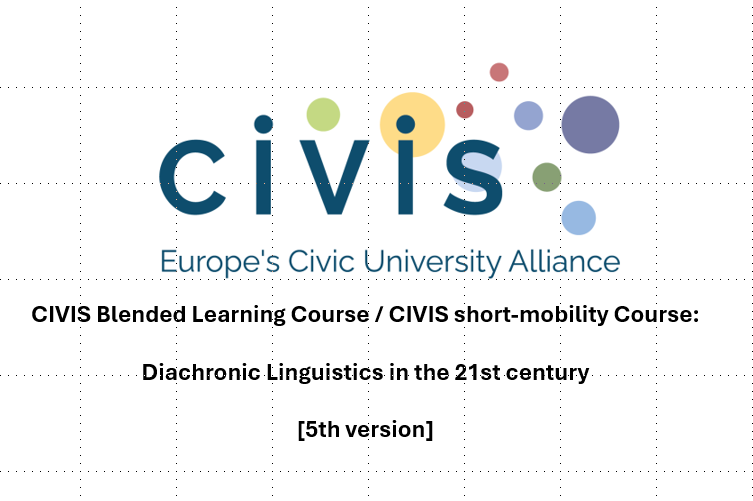
This CIVIS Blended Intensive Programme will introduce participating students to an interdisciplinary way of studying the development of languages, focusing on ancient and medieval European languages and on a contrastive approach.
Students will acquire advanced knowledge of the modern theoretical approaches to the study of ancient and medieval languages, both in relation to the analysis of their grammar and to the examination of the correlations between society (for instance, in the cases of language contact), culture and linguistic development.
Moreover, students will be involved in small linguistic and computational historical linguistic projects that aim to build advanced knowledge of the methodology of describing, analysing and explaining the grammar and the development of ancient and medieval languages.
This CIVIS Blended Intensive Programme includes an introduction to the methodology of computational and statistical analysis of language change and the challenges of linking digital heritage data with historical linguistic studies.
Main topics addressed
The program provides to the students knowledge related to the following fields:
· Computational historical linguistic analyses: “From texts to grammar”
· New methodologies of describing, analyzing and explaining language change, the grammar and the development of ancient and medieval languages
· Modern theoretical approaches to the study of language change
Learning outcomes
Upon completion of the course, the students will:
Will acquire advanced knowledge of the modern descriptive and analytical approaches to the study of ancient and medieval languages, both in relation to the analysis of their grammar and to the examination of the correlations between society (for instance, in the case of language contact) and language change.
The students will also be introduced to the methodology of computational and statistical analysis of ancient and medieval Indo-European languages (mainly) and the challenges of linking digital heritage data with historical linguistic studies.
This CIVIS Blended Intensive Programme is devoted to the dissemination of the new approaches to the study of language change: modern linguistic theories in collaboration with technology and modern statistical analyses (historical computational linguistics and modern linguistic approaches as well as the perspective of digital heritage).
| Dates: 7 April - 25 July 2025 | Language: English (B2) |
| Location: Naxos, Greece | ECTS: 6* |
| Format: Blended | Workload: 180 hours |
| Contact: nlavidas@uoa.gr |
*Recognition of ECTS depends on your home university.
Physical mobility
20-25 July 2025, Naxos, Greece
In collaboration with the Naxos Summer School: NAXOS-Diachronic-Linguistics-2025.uoa.gr
This CIVIS course is a blended-learning programme that consists of an intensive online Spring School, online workshops and an intensive Summer School (40 hours of face-to-face classes) that will be held in Naxos, Greece in July 2025.
Selected students will be supported by a grant for physical mobility to Greece.
Virtual part
7 April - 30 June 2025
- 7 - 10 April 2025: Linguistic and computational historical linguistic intensive classes, lectures and masterclasses aiming at an advanced knowledge of the methodology of describing, analyzing and explaining language change.
- April - June 2025: Online workshops. Concrete dates to be announced. Small computational historical linguistic projects “From texts to grammar.”

